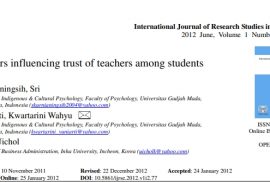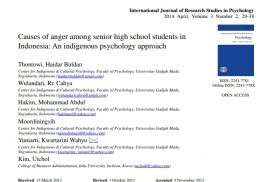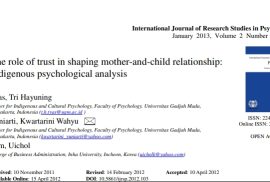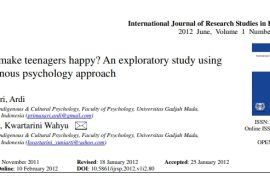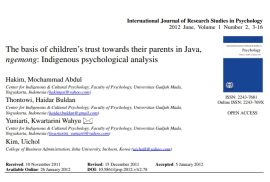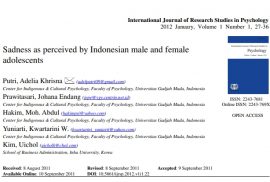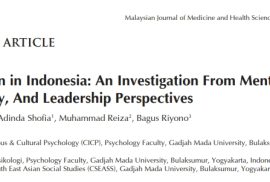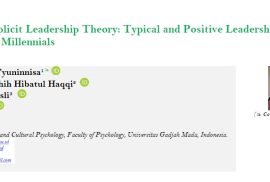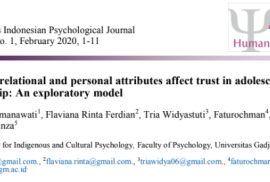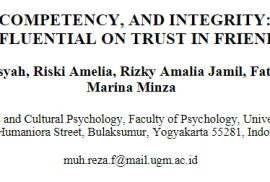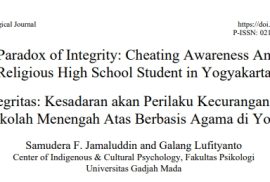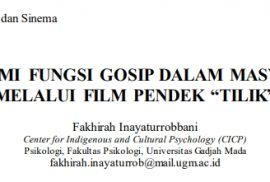ABSTRACT. In Indonesia, Ki Hajar Dewantoro is one of the most respected scholars in education philosophy. He stated the importance of trust earned by teachers in guiding students in their learning activities. The teacher, as the leader in the class, needs to develop mutual trust between students and teachers. Trust to teachers is strongly required by students as a foundation in developing and expanding their relationship and also social network. It is also the fundamental element in their desire to pursue higher education, for it is only through a sense of trust that student will embrace an empowering sense of freedom and pursuit the knowledge. The exercise of this freedom requires a risk on behalf of students based on the trust of their teachers and the learning experience that they provide. If students trust their teachers, they will be more able to focus on the task at hand and to work and learn more effectively. A total number of 291 senior high school students in Yogyakarta (males=147, females=144) completed an open-ended questionnaire developed for this study that asks how much they trust their teachers and the reason why they trust their teachers. The data was analyzed using indigenous psychological approach of analyzing the content of open-ended responses, categorization of the responses and cross-tabulating with demographic/background information. Results indicated that 63% of participants stated that they trusted their teachers. The main reason for trusting their teachers are as follows: they are perceived as being similar to their parents, teachers’ ability in transferring knowledge, the relationship with teacher, and their abilities of guiding students. The study concluded that trust of senior high school students was established because of views that teachers are parents that have competence in delivering knowledge and are formally established as teachers. Therefore a teacher’s behavior that similarly represents a parent’s behavior at home will produce a child’s trust and this will become the foundation for the students to learn better.
Journal Articles
ABSTRACT. Appraisal theorists have argued that anger is elicited when important goals have been obstructed. Using an indigenous psychology approach, the current study aims to test this premise by investigating the events that account for a person’s anger among Indonesian senior high school students. Data was collected using the anger item from the Happiness open-ended questionnaire, asking about events that make the subjects’ most angry. A total of 425 senior high school students consisting of 171 males and 254 females were involved in the study. The data was analyzed using an indigenous psychological approach by analyzing the content of the open-ended responses, categorization of the responses, and cross-tabulations with the respondent’s sex. The findings suggest that Indonesian senior high school students become angry when they their trust has been violated, insulted, encounter an unpleasant experience, and disturbance. Further analysis was conducted to identify variability upon male and female subjects. The chi square test that was run towards the variables events for causing anger and sex indicated a significant relationship (p<0.03). Male respondents were most likely to become angry when encountering unpleasant experiences while females were most likely to become angry when their trust has been violated. The findings are contrary to the notions that goal obstruction is central in eliciting anger.
ABSTRACT. The purpose of this study was to examine the role trust plays in shaping the parent-child relation and the reasons why children trust and distrust their mother. A total number of 507 university students (males= 140, females=367) at the Universitas Gadjah Mada completed an open-ended questionnaire that asked how much they trust their mothers and the reason why they trust and distrust their mothers. The data was analyzed using indigenous psychological approach of analyzing the content of open-ended responses, categorization of the responses, and cross tabulating. Result from these study shows that 57.63% of participants’ trust their mothers to a great extent and 33.69% of respondents largely trust their mothers. Second, there are five main categories of reasons for trusting mothers and six main categories of reasons for distrusting their mothers that have emerged. First category focuses on mother’s personal quality such as honesty and reliability. Second, what mothers are able to bring into the life being that involved mother critical role for children surviving the world, physically, psychologically, and socially. Third, what exist between the relations counts the trust existence. Fourth, the perceived figure of mother. Fifth, the role of self in deciding when to trust. The six categories for distrust suggest the unconditional trust toward mother that indicate the strong bend of trust-relation between mother and children once it is established. It reaches to the conclusion that reasons for trusting mother is much colored by the spiritual and emotional nuance, whereas honesty and reliability, empathy, give the best, closeness and consanguinity, are factors that play quite important role in the development or establishment of trust to mother. From the reasons of trust and distrust, we learned that trust can play as the modality to consider act or to relate and as a product or result and is dynamic rather than static.
ABSTRACT. The aim of this research was to explore what make teenagers happy. The study was a survey on the total number of 467 high school students (males=198, females=269). An open ended questionnaire was used to learn what makes teenager happy. The data was analyzed using indigenous psychological approach. Preliminary coding, categorization, axial coding and cross-tabulation were run accordingly. The respondents’ answers were analyzed using descriptive analysis. Results showed that there were three elements of the source of teenager’s happiness, those are: (1) relations with others (50.1%) consisting of events concerning their families, relations with friends, and events related to love and being loved; (2) Self-fulfillment (32.67%) consists of events related to achievement, the use of leisure time, and money; (3) Relation with God (9.63%) consists of spiritual events that involve the relations between teenagers and God. This study gave the insight that family-bond remain importance. Their being teenagers does not shift the reference into peer groups, rather than that, family is the main source of their happiness. It is also concluded that all are nothing but social engagement.
ABSTRACT. The word among is used to describe the parent-child relationship in Javanese cultural context. Javanese is one of ethnic groups in Indonesia. According to Dewantara (1968), among consists of three nurturing components: providing affection (asih), stimulating potentials of the child (asah), and fulfilling the needs of the child (asuh). The purpose of this study was to examine the relationship between the concept of among and the development of trust towards parents. This study examines the reasons why Javanese trust their mothers and fathers. A total number of 356 Javanese students (males = 97, females = 259) at Universitas Gadjah Mada completed open-ended questionnaires, asking how much they trust their parents, and the reasons why they trust their parents. The data was analyzed using indigenous psychological approach. Preliminary coding, categorization, axial coding and cross-tabulations were run accordingly. Results show as the following: first, the students tend to trust their mothers more than their fathers. Second, trust to mothers was more on the direction of emotional bonds, whereas trust to fathers was more related to the cultural expectations. The three components of among (asih, asah, and asuh) were also found in the results of the study and appeared to be frequently stated in the responses. The study concluded that Javanese children’s trust to mother tends to base on affectional (asih) and caring (asuh) aspects, while their trust to fathers laid on teaching and modeling (asuh) aspects. Many psychologists believe that the characteristics of children’s general trust which is growing in the family context become the basis of social relation in the social interaction. It is good to know that, so parents will also have to learn the expection of their children to facilitate them growing, and eventually leading to their fruitful accomplishments of the children. Parental education in forming the basic trust for facilitating the children’s growth in the local context is something we might need to develop and construct in the future. In the long future these will contribute, to the reduction of any conflicts and social friction, which (was suspected) originated from the lack of trust between social groups. A strong foundation of trust is eventually strenthening the establishment of harmonious society under the frame of Unity in Diversity (Bhinneka Tunggal Ika), the basis of Indonesian nationalism.
ABSTRACT. Adolescence is a transition phase filled with doubt and instability. During these transitions, some obstacles are often perceived as more intense and frequently cause adolescents to feel sad. This study was aimed to identify how male and female adolescents perceived sadness. A total number of 461 students, 273 females and 188 males, all of whom were high school students in Yogyakarta, completed an open-ended questionnaire, developed by Kim and Park (2006). The data was categorized, open-coded, axial-coded, and later cross-tabulated. Results demonstrated that females perceive negative moments as a life-lesson (30.4%), self reflection (13.9%), disruption (13.6%), life’s obstacles (8.1%), motivation (6.6%), memorable moments (6.6%), and lastly as a spiritual-lesson (2.6%). While males view sadness as a life lesson (22.9%), disruption (15.4%), self-reflection (11.2%), motivation (9.6%), memorable moments (5.9%), life’s obstacles (5.3%), and lastly as a spiritual lesson (3.2%). This result was later divided into two types of perception, the positive approach, containing life lesson, self-reflection, motivation, and spiritual lesson, and the negative approach, which are sadness as disruption, memorable moments, and life’s obstacles. This study concludes that both Indonesian male and female adolescent mainly took a positive perception on sadness as a life lesson, with only 27% of them viewing it as negative.
Introduction: This article explores the phenomenon of massive corruption in Indonesia, from the perspectives of “mental health”, “spirituality”, and “leadership”. The extensive corruption in Indonesia becomes a contradiction, considering Indonesia is known as a country with largest number of Muslims in the world. Methods: This study used qualitative method through discourse analysis in trying to explain what is really happening? Why is the country that supposedly promoting religious, moral, and spiritual values; yet trapped in extensive “culture of corruption”? Why are the components of “mental health”, “spirituality”, and “leadership” important in the context of corrupt behaviors and corruption eradication efforts? What is the position of “mental health” if associated with corruption? Results: Specific behaviors of corruptors in Indonesia: repetitive pattern of lies and manipulative behavior; campaigning opposing corruption while doing it behind the curtain; smile, calm and composed, even after committing crime; showing no signs of remorse and degree of arrogance; surprised when sentenced; stating the belief in legal process, yet playing with the very same legal process. Conclusion: This study’s highlights “spirituality” as pivotal factor affecting the components of “mental health” also “leadership”; and ultimately influencing behavior of leaders. As a country with substantial “spiritual capital” of largest Muslim population in the world, it is time for “spirituality” to no longer dwell at level of “religious rituals”, but internalized deeper into values that transform behaviors of government officials/bureaucrats.
ABSTRACT. Leadership studies in Indonesia tend to discuss the way leadership affects individual attitudes and behavior as well as team effectiveness. However, a more contextual and recent approach study in understanding leadership remains underdeveloped. As a preliminary, this study aims to explore the concept of Indonesia’s leadership based on local perspectives by taking into account Implicit Leadership Theory. Data were gathered by involving 404 millennials (63,6% female, 36,4% male) using an open-ended question namely “Describe three characteristics of a leader” and two scales asking participants’ perception about how typical and effective each leaders’ characteristic count for leadership. A total of 1159 responses were analyzed using thematic analysis and demonstrated four characteristics depicting prototypes of leaders namely moral (41,07%), generally-competent (29,42%), charismatic (20,79%), conscientious (8,71%). A one-way ANOVA was also conducted to compare the effect of leader’s prototypes on perception of typicality and effectiveness of leadership. There was a significant effect of leadership prototypes on perception of typical leadership at the p<.05 level for the three conditions for each of perception about how typical and effective the prototypes reflect leadership. However, at the level of prototypes, no differences were found in perceiving which prototypes were considered as more typical and effective. The descriptive scores of each prototype indicates all of the prototypes were perceived as high in reflecting typicality and effectiveness in leadership. In conclusion, all leadership prototypes emerged from the responses were perceived as both typical and effective by the participants.
ABSTRACT. Trust is an important aspect in human relationship. According to previous research trust is influenced by 2 main attributes: personal (benevolence, integrity, and competence) and relational (support, closeness, and reciprocity) attribute. The study aimed to find a preliminary model to explain the association of personal and relational attributes in adolescent friendship. Two hundred and twenty participants (male=44.09% and female=55.91%) participated in the study. A survey method was used to collect the data. The design of this study was correlational design. Results from enter method in regression analysis show that six factors of personal and relational attributes influence trust at 44.5%. However, closeness had no significant influence on trust, so closeness was not included in the next analysis, the sequential analysis. The result shows that the relational attribute has higher influence on trust than personal attribute. Support and reciprocity factors which belong to relational attribute, has a higher contribution to trust in adolescent friendship than benevolence, integrity and competence – the latter three factors belonging to the personal attribute. Therefore building trust in friendship requires an emphasis on relational attributes of trust, especially that of support and reciprocity factors.
ABSTRACT. Personal variables are often assumed to affect trust. In Indonesia, there are three personal variables that affect trust: benevolence, competence, and integrity. This study aims to examine the influence of these three variables on friendship relationships. The respondents of this study consists of 220 students of Universitas Gadjah Mada (44.1% male and 55.9% female). Data were collected using the Trust Scale (α = .74), the Benevolence Scale (α=.85), the Competence Scale (α = .80), and the Integrity Scale (α = .78). Regression analysis revealed that competence has no significant influence towards trust, and the role of benevolence is greater than integrity. Based on these findings we constructed regression models with benevolence as the main variable and integrity as an additional variable. As a single factor, thecontribution of benevolence is 21.4%. The addition of integrity in the regression model finds that the contribution of both variables together is 29.2%.
ABSTRACT. Cheating behavior in a school setting has become a major problem in many countries, including those with a dominantly religious population (e.g., Indonesia). This creates a paradox since previous literatures suggest eminent role of spirituality and cheating behavior in religious high school students in Yogyakarta using multi-methods approach. Self-report were distributed to a total of 691 participants using random sampling method. Participants were also given an open-ended questionnaire asking the rationale behind their past cheating behavior. The findings suggested that the role of spirituality in ethical behavior was rather contextual, such as the link between spirituality and awareness of cheating was more robust in the respondents from religious schools. It was found that the participants viewed spirituality as an internal moral compass which may in turn facilitate overt ethical behavior.
ABSTRACT. Gossip is a daily phenomenon but largely neglected in the scientific literature. Therefore, this study aims to analyze the dynamics of gossip activities in the Tilik short movie. The theory used is the Self-Concept Enhancing Tactician (SCENT) model, which shows that a person is looking for information and evaluating that information with three objectives: self-empowerment, self-promotion, and selfprotection. The method used in this study was an interpretative qualitative approach (Denzin) to explain the function of gossip in Tilik movie. The result of this study indicates that gossip has two prominent functions: self-promotion and selfprotection. If the gossip is perceived by the gossipmongers as a downward comparison, the chance for self-promotion is higher. Meanwhile, if it is considered as a threat, individuals will protect themselves in various ways. Self-promotion involves the emotion of pride and self-protection involves the emotion of fear. This research is expected to add insight into how gossip is used in society.
ABSTRACT.Yogyakarta dan Bandung merupakan kota favorit untuk menempuh pendidikan. Ketika bermigrasi, kaum muda akan menghadapi proses adaptasi dengan lingkungan baru. Kegagalan saat beradaptasi dengan lingkungan baru akan memicu masalah psikologis seperti stres, cemas, dan gegar budaya (culture shock). Oleh karena itu, penelitian ini dilakukan untuk mengeksplorasi pengalaman kaum muda dalam beradaptasi selama bermigrasi ke kota Yogyakarta dan Bandung. Penelitian ini dilakukan dengan melibatkan 200 mahasiswa di Yogyakarta dan Bandung. Diskusi Kelompok Terarah (DKT) dilakukan dengan menggunakan analisis data tematik. Hasil penelitian menunjukkan bahwa, ketika kaum muda bermigrasi dan melakukan proses adaptasi, mereka cenderung mencari informasi, berinteraksi, dan menyesuaikan diri. Terdapat juga faktor predisposisi yang memengaruhi proses adaptasi kaum muda selama bermigrasi, yaitu faktor
penghambat dan faktor pendukung selama beradaptasi. Penelitian ini memberikan sumbangsih terhadap perkembangan ilmu psikologi mengenai proses adaptasi dan faktor predisposisi pada kaum muda yang bermigrasi ke kota Yogyakarta dan Bandung. Penelitian ini juga diharapkan dapat memberikan pengetahuan kepada kaum muda yang memiliki pengalaman pertama melakukan migrasi ke kota besar.
ABSTRACT. Previous research conducted by the same authors found that personal attributes (benevolence, integrity, competence) and the relational attributes (closeness, support, and reciprocity) influence trust and trustworthiness. This paper aimed to test the proposed trust model on a new dataset while also testing for gender and regional differences. This research involved a collaboration between Universitas Gadjah Mada as a representative from Yogyakarta and Universitas Negeri Makassar as a representative from Makassar. There were 420 students that participated in this study; 157 (37.4%) men and 263 (62.6%) women. Regression analyses indicated that 42% of trust was formed by personal and relational attributes. Contrary to expectations, there were no differences in trust (p> 0.05) between females and males. However, there was a significant difference in trustworthiness (p0.05). This study provides an understanding on the importance of trust and trustworthiness in efforts to maintain pluralism, as a form of citizenship identity.
ABSTRACT. Two studies were conducted to examine the relationship between three different types of intergroup contact (i.e., direct contact, extended contact, and online contact) and outgroup evaluation, and the moderating effect of group status and sociopolitical contexts across two cultural contexts. A total of 75 European Americans (majority) and 44 Chinese Americans (minority) participated in Study 1; whereas 61 Javanese (majority) and 72 Chinese Indonesians (minority) participated in Study 2. In both studies, participants completed an outgroup feeling thermometer as well as a set of questionnaires measuring intergroup contact, perceived outgroup political power, perceived outgroup economic power, perceived government support, and perceived quality of the current intergroup relations. Results from the two studies revealed that although contact was beneficial in both cultural contexts, there were notable moderators of the links between contact and outgroup evaluations. Specifically, the value of direct contact was greater for the minority group members in the United States, extended contact only mattered in a specific condition when the perceived government support was taken into account in the United States, and online contact was beneficial across group status in the Indonesian context. Overall, the findings provide evidence of the need to take into account the role of specific sociopolitical relations between the two groups in intergroup relations research.

